

BEIJING, Aug. 7 -- A new mother who died of heatstroke after strictly adhering to the Chinese tradition of "postpartum confinement" elicited heated discussion on whether the tradition should be abandoned.
The mother became seriously ill after remaining wrapped in a thick quilt without turning on the air-conditioner following labor. She died after being sent to Shanghai Fengxian District Central Hospital, according to one of the hospital's emergency ward staff on Friday.
Local media Thepaper reported a similar tragedy several months ago, in which a new mother who refused to move during her"zuoyuezi" time died of pulmonary artery thrombosis.
Literally translated to "sitting the month", "zuoyuezi" is a Chinese practice that encourages a new mother to rest in her home for one month after giving birth, during which she will be specially attended.
The mother should follow instructions that range from avoiding opening windows, eating things cold to washing hair. They are advised not to leave their bed, depending on how strictly one adheres to the tradition.
Chinese people believe postnatal recovery is critical to maintaining long-term health. And the latest tragic case has resulted from the folk concept of keeping a "hot-and-cold balance", said Wang Xiaoli, a professor from School of Public Health, Peking University.
"A woman giving birth to a child will shed a great deal of blood, something considered 'hot'. It is traditionally believed they should be nourished by something hot, such as soup, after delivery. They are also encouraged to wear more clothes than usual and avoid wind," she said.
However, according to Zhang Yun, a head nurse of Obstetrics and Gynecology Hospital of Fudan University in Shanghai, if too much heat stays in the new mother's body for too long time, it could lead to a circulatory failure, or even damage the nerve system.
The case triggered a debate among Chinese people online, with most arguing the outdated custom should be abandoned.
"It is one of the superstitions in the ignorant age. Women in other countries never have to zuoyuezi, but they also maintain a healthy life," argued user "Pujiedewangxiaomei" on microblog Sina Weibo.
Many believe the tragedy is an extreme case. The tradition makes sense to Chinese because of the differing physical conditions of eastern and western people.
Just three months ago, Chinese audiences were stunned by the fact that, just a few hours after giving birth to a baby girl, Kate Middleton, the Duchess of Cambridge, appeared outside the hospital.
Wang conducted a survey on more than 20,000 new mothers in 105 Chinese counties 10 years ago and found that about 71.9 percent didn't wash their hair and 37.2 percent didn't open their windows during the postnatal month.
The tradition hasn't changed much, even in cities. It is a result of influence from older generations, Wang said. Many Chinese seniors blame their current health problems, such as migraines, backaches or arthritis, on the fact that they didn't have a very good rest during the postnatal month.
Some of the tradition may benefit the new mother, but some do not, Wang added. "Keeping warm regardless of the heat is an overreaction, and the unhygienic customs make them highly prone to infection."
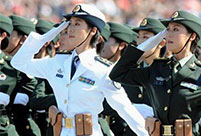 Female soldiers add color to military parades
Female soldiers add color to military parades Taiwan campus belle with gorgeous look
Taiwan campus belle with gorgeous look  Stunning photos of China’s fighters and airborne troops
Stunning photos of China’s fighters and airborne troops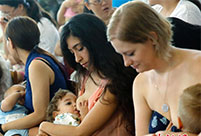 Mums stage breastfeeding flash mob
Mums stage breastfeeding flash mob PLA South China Sea Fleet conducts live fire exercise
PLA South China Sea Fleet conducts live fire exercise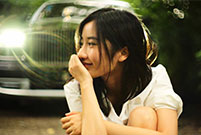 Beauty of Tsinghua University transforms into car model
Beauty of Tsinghua University transforms into car model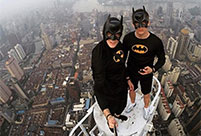 Moscow “spider-man” climbs Chinese skyscraper
Moscow “spider-man” climbs Chinese skyscraper No cleavage allowed at China’s largest gaming expo this year
No cleavage allowed at China’s largest gaming expo this year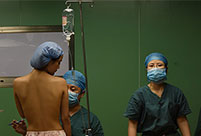 Photo story: A model’s breast implant surgery
Photo story: A model’s breast implant surgery Shared destiny for Asia: FM
Shared destiny for Asia: FM Web police stations not to curb expression
Web police stations not to curb expression More civil servants leaving their jobs for better pay, sense of achievement
More civil servants leaving their jobs for better pay, sense of achievement Japan struggles to deal with legacy of comfort women system, compensation
Japan struggles to deal with legacy of comfort women system, compensationDay|Week